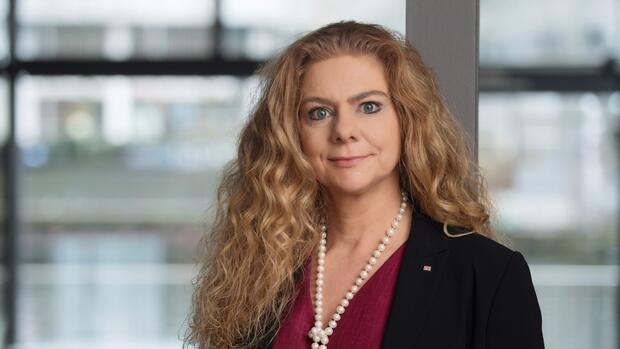Before her time as a digital strategist at Deutsche Bahn, Jeschke worked as a computer science professor at RWTH Aachen University.
(Photo: Deutsche Bahn AG / Max Lautenschlaeger)
Berlin The Frankfurt start-up Quantagonia receives 4.3 million euros in venture capital from investors. The Handelsblatt learned this from the founders, including the former digital head of Deutsche Bahn, Sabina Jeschke.
The company is developing a translation service for novel quantum computers. “We’re building a platform that gets existing programs up and running there,” said co-founder Dirk Zechiel. The standard code cannot simply be rewritten due to the complex quantum technology. “For that you actually need a computer scientist, physicist and mathematician at the same time.” Because this is not possible for every company, according to Zechiel, Quantagonia is developing a solution that connects both worlds.
In order to be able to further expand the offer, the start-up, which was founded in 2021, is now getting fresh money from investors such as Tensor Ventures, Voima Ventures from Finland and the Fraunhofer Technology Transfer Fund. However, the founders did not provide any information on the evaluation.
The initiation of the financing round was very demanding, said Zechiel. Some investors are also cautious because it will still be a few years before quantum technology is really used. “You have to wait for the hardware,” said the artificial intelligence (AI) expert.
According to a McKinsey report, quantum technologies could soon solve problems that cannot be solved with conventional computers or only at great expense. According to the report, future revenue and cost savings could be as high as $1.3 trillion by 2035 in the automotive, chemical, finance and life sciences industries. Despite the potential, financiers are also cautious in view of the turnaround in interest rates and the ongoing weakness in the economy. Investments in start-ups stagnated last year.
perspective unclear
Nevertheless, according to Zechiel, there is a spirit of optimism in the industry. Looking at the hype surrounding AI, which has sometimes resulted in surprisingly high financing rounds, he said: “Maybe ChatGPT is currently more popular because it is easier to understand. But there is also a lot of music in quantum technology.”
Read more about this here: How car manufacturers want to stop the hackers of the future
The federal government is now also attaching greater importance to quantum technology. By 2026, three billion euros are to flow into the promotion of quantum computers and their application. According to Zechiel, however, it should also become easier to promote start-ups in this context: “Because we cannot afford to put time into a week-long tender with an uncertain outcome.” The founding team hopes that the next round of financing will be in expected two years.
The AI expert Zechiel founded Quantagonia together with Philipp Hannemann, Sebastian Pokutta and the former Deutsche Bahn board member Sabina Jeschke. Before her time as a digital strategist at Deutsche Bahn, Jeschke worked as a computer science professor at RWTH Aachen University.
Quantum computers are able to solve a large number of computing tasks in parallel, which should ensure innovations, especially in logistics and pharmaceuticals. However, there are different approaches to building a quantum computer. So far it is still unclear which will ultimately win the race.
Quantagonia doesn’t want to be deterred by this. “It is not important to us which architecture or technology prevails in quantum hardware. We will offer everything,” said Hannemann. At least that’s the goal. Quantagonia is not alone in this. Competitors include the start-up Bleximo from California.
More: Microsoft presents “roadmap” for quantum computers

